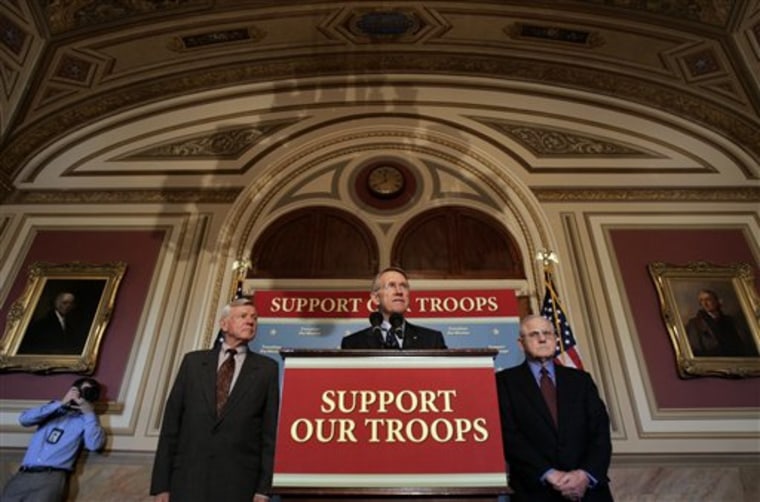Congressional Democrats say there is no doubt President Bush will soon be confronted with legislation calling for an end to the Iraq war.
But the new majority must decide how far to go in trying to tie Bush's hands and what will happen after the president's inevitable veto.
The debate is likely to expose fissures among Democrats, who remain divided on whether to cut off money for the unpopular war and risk leaving troops in the lurch.
The funding factor
"My feeling is at a certain point we're going to have a 'come-to-Jesus' moment in the caucus and talk about whether you fund (the war) or not," said Rep. Jim McDermott, D-Wash.
McDermott is one of 218 House members, mostly Democrats, who voted March 23 for legislation that would order combat troops out of Iraq by September 2008.
Like some of his anti-war colleagues, McDermott was initially reluctant to endorse the bill because it included $96 billion for the military, much of which would keep the war afloat for another six months.
The narrow 218-212 vote came only after House Speaker Nancy Pelosi, D-Calif., launched an aggressive whip operation to convince party liberals the bill was their best shot at ending the war. Most Democrats do not support yanking funding for the war.
On March 29, the Senate voted 51-47 for a similar, but less sweeping measure. That bill would require that Bush begin pulling out an unspecified number of troops right away with the goal of ending combat by March 31, 2008.
Compromising begins
As early as Tuesday, House and Senate appropriators were expected to begin negotiating a final bill. In doing so, congressional leaders will be seeking a compromise that won't turn off more liberal Democrats like McDermott and retain the backing of the party's more conservative members like Sen. Ben Nelson, D-Neb., who is against imposing a firm deadline on military commanders.
The compromise bill will require a final vote in both the House and Senate before reaching the president's desk. Most members regard such a vote as merely procedural so Democratic leaders are not anticipating serious opposition to the conference agreement no matter the outcome.
Nevertheless, the conference negotiation and Democrats' response to Bush's veto is expected to tip off a fresh round of debate on how far Congress should go to end the war.
"Listen, I understand Republicans and Democrats in Washington have differences over the best course in Iraq," Bush said Monday. "That's healthy. That's normal, and we should debate those differences. But our troops should not be caught in the middle."
Making political points
Administration officials and congressional Republicans say the fate of the U.S. military in Iraq should be in the hands of the president and his military commanders.
Democrats shouldn't "make political points by delaying the essential supplies, materiel and training our forces in the field," said Senate Republican leader Mitch McConnell, R-Ky.
House Republican leader John Boehner, R-Ohio, added: "Each day that passes without a clean troop funding bill puts our soldiers in greater danger and weakens their ability to fight al-Qaida."
Sen. Carl Levin, D-Mich., told reporters Monday that should Bush veto the bill as expected, Democrats would likely opt to replace the withdrawal language with a "softer version" that ties U.S. aid to political progress made by the Iraqi government.
"It's the second-best approach in terms of how to force the Iraqi government to reach a political settlement," he said. "Everyone is saying there is no military solution, yet the president's path is a deepening military presence."
Majority Leader Harry Reid, D-Nev., told reporters Monday he was open to the idea.
"The president is not going to get a bill that has nothing on it," Reid said.
Reid also repeated assertions that Congress was committed to funding the troops, despite the leader's support for separate legislation that would cut off money for combat missions after March 2008.
Reid said his promise to fund the troops is not at odds with the proposal because the measure would fund troops to stay in Iraq so long as they were engaged in non-combat missions. Those include counterterrorism and training of Iraq security forces.
